The Writing of Our Credo
This year marks a very significant anniversary at Johnson & Johnson: the 70th anniversary of Our Credo, the business philosophy that guides Johnson & Johnson. Written in 1943 by General Robert Wood Johnson and presented to the Board of Directors in December of that year, Our Credo is one of the earliest statements of corporate social responsibility, drafted almost three quarters of a century ago. But the origins of Our Credo actually go back much further than December of 1943. In fact, they go back to 1935 -- and back even further to the founding of Johnson & Johnson.
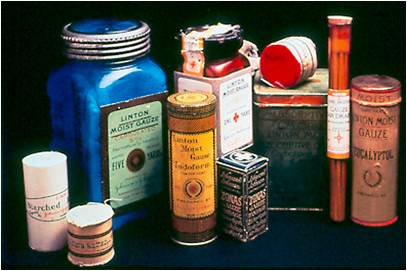
The first tenet of Our Credo: Responsibility to the Medical Profession, Patients, and Consumers: When Johnson & Johnson was founded in 1886, modern health care was in its very early infancy and most of the standards and technologies of modern medicine that we take for granted didn’t exist yet. The Johnson brothers’ new company, at the forefront of helping make surgery sterile, began addressing the great unmet needs of that era beginning with the introduction of mass produced, ready to use sterile dressings and sutures (1887), and a free how to do sterile surgery manual (1888); the first commercial first aid kits (1888); trusted products for parents to care for babies and small children (1894); maternity kits to make childbirths safer (1894), and more. Johnson & Johnson pioneered these products with the collaboration of doctors and surgeons and feedback from consumers. The Company also provided free information to the public on prenatal and infant care, disease prevention and more. This early philosophy of putting patients and customers first was summed up in Fred Kilmer’s 1910 quote about founder Robert Wood Johnson:
“When once convinced that an article which he could manufacture would save life and prevent suffering, he caused it to be manufactured and placed before the [medical] profession irrespective of any consideration of profit.” [Fred Kilmer, 1910, writing about Robert Wood Johnson.]
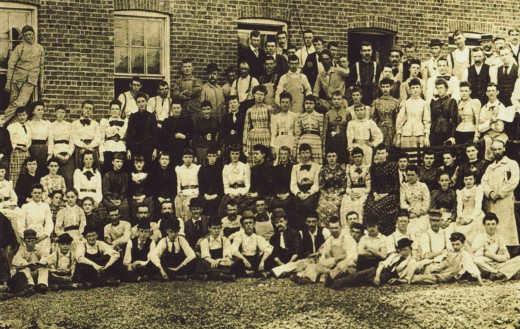
The second tenet of Our Credo: Responsibility to Employees: The Company’s early sense of responsibility to employees – at a time before that was usual -- was reflected in the wide range of employee benefits at Johnson & Johnson. The Company had an early emphasis on the health and well-being of its employees, which included – over 100 years ago -- on-site medical care, free hot meals for night shift workers, free educational classes, on-site exercise facilities and classes, comprehensive safety measures (again, at a time before that was standard practice) and teams of trained employee first aid responders. Employees, responding to the care and concern for their welfare, embraced the Company’s attitude and values, and began volunteering in the community beginning in 1907.
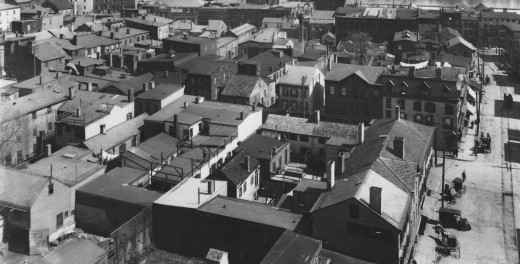
The third tenet of Our Credo: Responsibility to the Community: Caring for the community also has early roots at Johnson & Johnson. In 1898, when it was discovered that the U.S. Army had greatly underestimated the number of dressings to treat wounded soldiers that it had budgeted for, Johnson & Johnson supplied the additional dressings at no cost, because they were needed to save lives. Johnson & Johnson began its long tradition of disaster relief two years later, in 1900 and, in 1936, General Robert Wood Johnson used some of his own personal stock to form the Johnson New Brunswick Foundation, designed to help the people of New Brunswick through the Great Depression. Some of the early work the foundation did included feeding and clothing the city’s children, helping residents who had lost their homes, and helping people further their education by attending medical, dental and nursing schools.
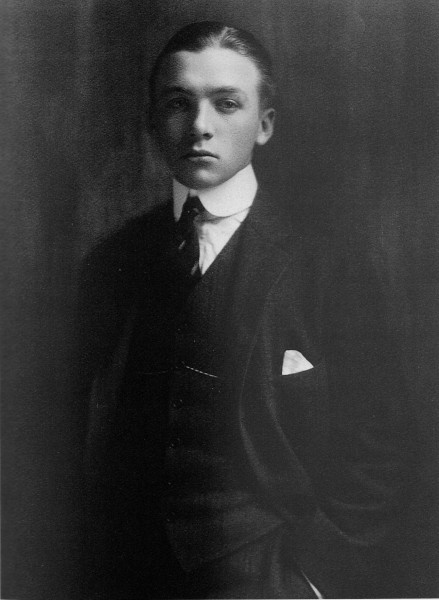
General Robert Wood Johnson, the author of Our Credo, had quite literally grown up at Johnson & Johnson. His father began bringing him to work when he was a small child, and he started his career here as a teenager in the 1910s. Johnson rose through the ranks and took over the leadership of the Company in 1932, during the depths of the Great Depression. He expanded on the Company’s business philosophy put in place by his father and uncles. Johnson’s experience starting his career as an entry level mill hand gave him an appreciation for the dignity of work at all levels of the organization, and his service as mayor of Highland Park, New Jersey during the 1920s emphasized the importance of service and of meeting people’s needs. Johnson quickly became known as a creative, forward-thinking and outspoken business leader.
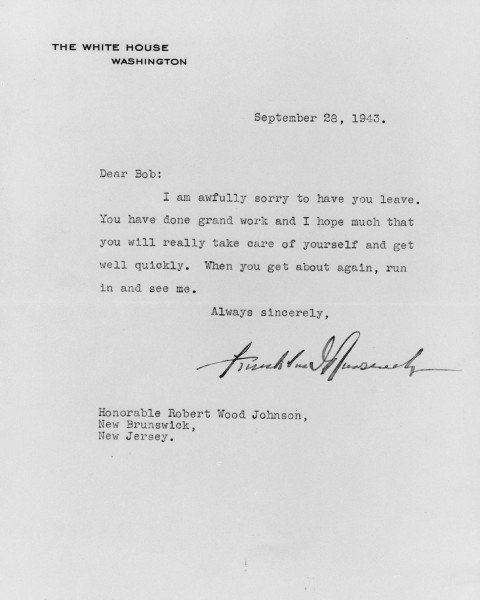
When Franklin Delano Roosevelt was inaugurated in 1933 as President of the United States, Robert Wood Johnson sent him a letter outlining his ideas for a plan for the nation’s recovery, calling for a Federal law increasing wages and reducing the number of hours in the work week. Johnson’s plan received wide attention in the media, and it caught Roosevelt’s attention. In June of that year -- during the Depression -- Johnson gave employees a five percent raise, saying that he hoped it would sent a trend for the rest of the industry. (It didn’t; very few companies followed his example.) In that same year, Johnson & Johnson expanded, opening new facilities in Chicago.
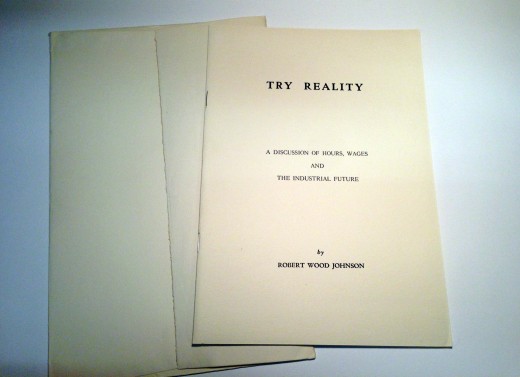
Frustrated by the lack of response to his ideas from other business leaders, Robert Wood Johnson sat down at his home in Princeton, New Jersey in 1935 (he was living at Morven, the historic mansion at the time), and wrote a pamphlet called Try Reality. Johnson was in the habit of writing out his ideas longhand on yellow legal pads (we have some of his letter drafts on yellow legal paper in our archives), and that’s how he wrote Try Reality. Johnson intended it to be his answer to his peers, and copies of the pamphlet in our archives are housed in specially-fitted envelopes, used to mail the booklet to other business leaders. Try Reality contains the earliest written expression of the ideas in Our Credo. Here are some excerpts:
“Industry only has the right to succeed where it performs a real economic service and is a true social asset.”
It is to the interest of modern industry to realize that service to its customers comes first; service to its employees and management second, and service to its stockholders last. It is to the enlightened self-interest of industry to accept and fulfill its share of social responsibility.”
-- Robert Wood Johnson Try Reality, A Discussion of Hours, Wages and The Industrial Future, 1935
Johnson continued to advocate publicly for his ideas and put them into practice at Johnson & Johnson. He was appointed by President Roosevelt to serve as the head of the Smaller War Plants Corporation in Washington, D.C. in 1942, and while he was in Washington on a leave of absence from Johnson & Johnson, he continued to think about the social responsibilities of business. (For anyone who’s wondering how Johnson got the title of “General,” his Washington position was a military one. He was named a one-star Brigadier General, and the title followed him back to civilian life.)
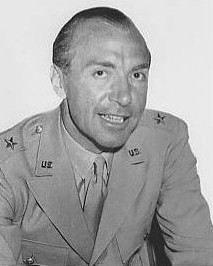
Late in 1943, the Johnson & Johnson Board of Directors got the word that General Johnson would attend the December board meeting, his first since his return from Washington. At the meeting on December 13, 1943, he presented the board with some momentous news: Johnson & Johnson was going to go public in 1944, with a listing on the New York Stock Exchange. But before that happened, Johnson wanted to reinforce the Company’s philosophy to make sure it remained unchanged as this very personally-run organization went public. Thanks to D.C. and L.K., here is a quote from the minutes of that historic meeting, at which Robert Wood Johnson and the Company’s Board of Directors formally discussed the defining values Johnson & Johnson has held since its formation.
“General Johnson expressed the thought that it was an opportune time to review the general concepts which he felt should govern the conduct of the corporation’s affairs. The first concern should be to provide the consuming public with goods of the highest quality…Next in importance he ranked the maintenance of full employment at a fair scale of wages…Fourth he placed an adequate return on the capital invested by the stockholders… ” [Minutes of A Meeting of the Board of Directors, Johnson & Johnson, December 13, 1943, from our archives.]
(Although responsibility to the community was understood in Try Reality’s line about companies accepting and fulfilling their fair share of social responsibility, it would not officially be part of the wording of Our Credo until 1948.) Johnson called these values “…the fundamental basis for conduct of the corporation’s affairs…”
It is to this 1943 board meeting that we date the introduction of Our Credo. The following year, Robert Wood Johnson published it in his book, But, General Johnson --, calling it “An Industrial Credo” that all of American industry should adopt. Our Credo remains one of the earliest statements of corporate social responsibility. Seventy years after that historic board meeting -- and 127 years after Johnson & Johnson was founded – Our Credo remains the guiding set of values at Johnson & Johnson.


What an amazing glimpse into the history behind our credo!
Wow! This is a great behind-the-scenes look at Our Credo. Thank you, Margaret, for sharing this with us.
I LOVED reading the history of this! Not only did I find it fascinating, but very forward-thinking for it's time. It also gives us great insight into the empathy, and generosity of our very own "General." Thanks so much for sharing!
What a great read! Fascinating history.
If only more of the industrial magnates of our times would envision and hold similar values as our founding leaders, at JnJ, the working classes all across our nation, -and perhaps all over the globe-, would be much better off.
We need to do our part to keep inspiring others to follow this example!
Thank you for posting up such valuable info.
Among some very valuable documents of my family I discovered, today, a poster by Johnson & Johnson, of a nurse. At the bottom it is written: "Forward" then under that; " On the threshold of a noble career, the graduate nurse moves forward in a calling devoted to the service of humanity - Wherever she may serve, her uniform stands as a symbol of trained intelligence, her courage and loyalty inspire respect and confidence."
It measures almost 12" by 15". Can you tell me anything about this poster? Year? ...? Thank you.
In reply to by Mickey
Hi Mickey,
Johnson & Johnson has a very long tradition of support for the profession of nursing, having employed graduate nurses in our early sterile surgical dressings and sterile manufacturing rooms over 100 years ago. Without seeing a picture of your poster, it's hard to tell. Can you forward me a photo of your poster at the blog's email? I will be happy to take a look at it. The email address is [email protected]. Looking forward to seeing it!
Margaret
I feel privileged to have the opportunity to work for a company founded by "The General" and whose guiding principals are grounded in caring for others.
Kevin.
So proud to work for J&J : took me a long time and many years of working with J&J and many of my talented supervisors and colleagues to understand what the General had in mind. Going through cauldron of realities and heated debates, ensuring that we saw a situation through multiple lenses and perspectives. Our employees are one of the most engaged and no wonder, we create more value than any other benchmark companies.